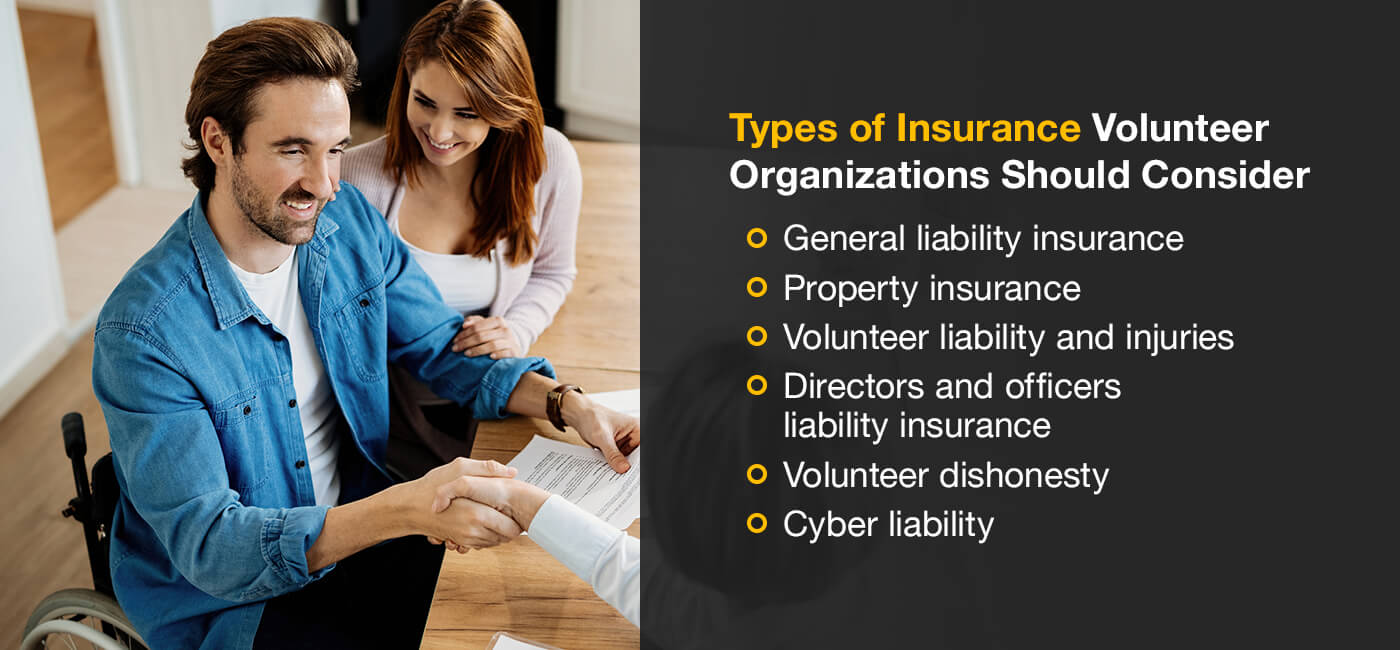Many nonprofit organizations rely heavily on volunteers to fulfill their mission. Volunteers can be a wonderful asset, but they can also be a liability. Have you considered what would happen if a volunteer were injured on the job or if they mistreated a client? What if they stole money from your organization? There are also general risks that any organization experiences, such as property damage from a storm or a client slipping on a puddle in the lobby.
Risks abound, but fortunately, so does insurance for volunteer organizations. This post discusses why volunteer organizations need insurance and what sorts of policies you should consider purchasing.
What Is Liability and How Can You Mitigate It?
Liability is a person’s or organization’s legal responsibility for something negative that occurs. Criminal liability has to do with purposeful or reckless criminal acts. However, in many instances, damages occur unintentionally or due to actions outside of your control.
The reality is that accidents happen. Take the example of a volunteer who was injured by an Amur leopard in a California animal sanctuary in February 2021. Despite the foundation having four pages of protocols for volunteers to follow, this unfortunate accident still occurred. Fortunately, the volunteer’s injuries were not life-threatening, but an instance like this can lead to medical bills and a possible lawsuit. This is just one example. Volunteer organizations can be exposed to all sorts of liabilities. Some possible scenarios include the following:
- A volunteer receives an injury on the job.
- A volunteer accidentally injures a third-party.
- A third-party is affected by a volunteer who acts inappropriately.
- A volunteer steals from your organization.
- A volunteer feels they were mistreated by your organization.
- Your property gets damaged.
- A cyber attack compromises your volunteers’ and others’ personal data.
Organizations should look for ways to minimize liabilities. One way is to have volunteers sign a liability waiver or release form. These documents are legally binding agreements that discuss the risks inherent in certain types of volunteer work and, if signed by the volunteer, prevent them from suing your organization if they get injured or are otherwise negatively affected. Some waivers may discuss specific risks associated with a volunteer position, such as dog bites for an animal shelter volunteer.
Though waivers are helpful, insurance is key to safeguarding your organization against risks. Liability insurance policies are designed to pay third parties who are negatively affected by your organization or one of your volunteers. These policies cover legal claims, which are notoriously costly. Other types of insurance policies can help volunteer organizations recover losses from issues that affect them directly, such as theft or property damage.

Types of Insurance Volunteer Organizations Should Consider
There are many types of insurance policies volunteer organizations choose to purchase. Some of the most common coverage types include:
- General liability insurance: One policy type that virtually all nonprofit organizations should have is general liability insurance, also called commercial general liability (CGL) insurance. These policies cover your organization if a third-party, such as a client or visitor, gets injured on your organization’s property. A general liability package may also include other types of coverage, such as professional liability and abuse and molestation liability. Some insurance carriers offer general liability and property insurance together under what’s commonly known as a business owner’s policy.
- Property insurance: If your organization owns the facility where you operate, you should also have commercial property insurance. You may want to purchase a property insurance policy even if you rent your facility since property insurance covers all types of property, including furniture, equipment, electronics, and supplies. In the event of a severe weather event, vandalism, or theft, your property insurance would help you recover what you lost. Note that flood insurance is typically a separate policy.
- Volunteer liability and injuries: In many states, volunteers are not covered under workers’ compensation insurance, with the possible exception of volunteers who provide emergency services. Fortunately, you can purchase a policy designed to offer similar coverage as workers’ compensation specifically for volunteers. These volunteer insurance policies may be geared toward covering physical injuries or may include other sources of liability, as well.
- Directors and officers liability insurance: Employees, volunteers, or clients can sue your organization’s leaders personally in addition to suing the organization. For example, if a former volunteer feels they were wrongly dismissed or discriminated against in some way, they could sue the director or officer they see as personally responsible in addition to your organization as a whole. This is why directors and officers (D&O) liability insurance is an important protective measure for your nonprofit’s leaders.
- Volunteer dishonesty: Hopefully, all your volunteers have integrity and good intentions in volunteering with your organization. Unfortunately, despite carefully screening volunteers, some organizations may experience a volunteer acting dishonestly for their own gain. If a volunteer misuses or steals assets, a volunteer dishonesty policy will help you recover the funds they took. Some grants require nonprofits to have a volunteer or employee dishonesty policy in place to receive funding.
- Cyber liability: Cyber threats aren’t just a danger for government agencies or large businesses. Nonprofit organizations can also experience network breaches, hardware theft, and other cybercrimes. These crimes can be costly financially and can compromise personal data belonging to employees, volunteers, clients, and donors. Implementing cybersecurity measures is key to preventing these problems, but if you fall victim to a cybercrime, cyber liability insurance will cover costs associated with legal claims and remedying the problem.
Why Insurance Is Important for Volunteer Organizations
Insurance is crucial for volunteer organizations just as it is for for-profit businesses. Your organization probably doesn’t have a savings account ready to pay thousands to a client or volunteer who files a claim against your organization. Instead, you want to use your funds to further your mission.
Unfortunately, many claims cost enough to put a nonprofit organization into severe debt. For example, harassment claims can easily cost upwards of $50,000 in damages. That doesn’t even count legal fees to negotiate a settlement or defend yourself in court. Overall, the cost of risk has been on the rise, so nonprofit organizations can’t afford to forgo having a plan in place.
Though you likely couldn’t afford to pay tens or hundreds of thousands of dollars in damages, hopefully, your organization can afford routine insurance premiums. Being covered by the right policies prepares you for unfortunate circumstances so you can overcome these situations without being undone by them. Knowing you’re prepared can give you peace of mind, as well, and that’s hard to put a price on.
Insurance companies can even help you avoid liabilities to begin with. They have a vested interest in helping you avoid claims because when they occur, the insurance company stands to lose financially. That’s why insurance companies will often help organizations shore up potential sources of liability so they can prevent problems.
Some outside organizations, such as foundations offering grants, may prefer or even require organizations like yours to have certain insurance policies in place. Having insurance for your volunteer organization demonstrates that your organization is responsible and prepared.

Manage Your Volunteer Team With Volgistics
Having the right insurance coverage is an important part of being a responsible volunteer organization. Another important piece is having a volunteer management system in place that keeps you organized and facilitates all the processes that help you minimize risk. This includes processing volunteer applications, screening volunteers, and keeping signed waivers on file, for example.
Volgistics can help you with all these needs and more. Our volunteer management software also offers the security measures you need to protect volunteer data. To learn more about how Volgistics can help you manage your volunteers, contact us today.

